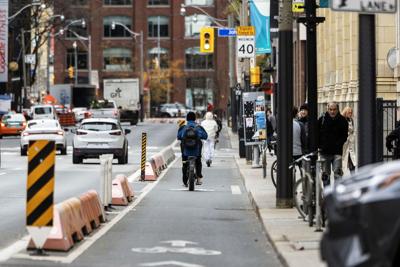A cycling advocacy group has launched a Charter challenge against the Ford government’s recent legislation that takes aim at Toronto’s bike lanes.
In , Cycle Toronto, along with bike lane users Eva Stanger-Ross and Narada Kiondo, argues that aä»section in the provincial government’s Bill 212 “puts lives at risk.”
The groupãs lawsuit seeks an immediate injunction to prevent the removal of bike lanes on Bloor Street, University Avenue and Yonge Street. It also asks the court to strike down the section of Bill 212 that allows for removal of the bike lanes ã which the provincial government says is a step needed to improve traffic flow in the gridlocked city ãä»if it finds it violates the Charter-protected rights to life and security of person.ä»
Michael Longfield, executive director ofä»Cycle Toronto, was unavailable for an interview Wednesday because he is in hospital after “getting doored” in a painted bike lane on St. Georgeä»Street earlier this week.ä»Longfield sustained a serious break in his right leg that required immediate surgery, “an all too common reminder for the need for protected cycling infrastructure like on Bloor, Yonge and University,” he said in a text.
In a press release, Longfield’s group argued there is evidenceä»separated bike lanes have little effect on congestion,ä»but do prevent death and injury. “Without evidence, the Government of Ontario claims removal of the bike lanes addresses traffic concerns and that they could be replaced by bike lanes on secondary routes. Those routes do not exist,” according to the release.
Bronwyn Roe, a lawyer at Ecojustice, who along with Paliare Roland LLP, is representing Longfield’s group, said thatä»Bill 212, “Reducing Gridlock, Saving You Time Act” is “an arbitrary and dangerous piece of legislation” and the province “cannot be allowed to put the lives of ¤È§úèÓú½¿ìë½cyclists and Ontarians at risk.”
Roe noted bike lanes are an “essential safety mechanism” in a city with people increasingly looking at alternative transportation methods.ä»Removing them, “locks in irresponsible car-dependence and is not in the best interest of communities,” she added.
Transportation Minister Prabmeet Sarkaria’s legislation was also amended recently to protect his government from lawsuitsä»if cyclists are injured or killed on streets where the bike lanes are removed. Cycle ¤È§úèÓú½¿ìë½called this amendment “a tacit acknowledgment of the safety risk the government is creating.”
Dakota Brasier, a spokespersonä»for Sarkaria’s office, did not comment on the lawsuit directly, instead pointing to a about how gridlock costs Ontarioãs economy $56 billion and 88,000 jobs annually.
“Gridlock is at an all-time high and we need to deliver on our plan to keep people moving by bringing sanity back to bike lanes and building new roads, highways and transit,”ä»Brasierä»said.
Some legal experts say the Charter challenge may be the only viable legal strategy to reverse course before the bike lanes are removed in the coming weeks.
The Cycle ¤È§úèÓú½¿ìë½lawsuit “is a very strong Charter challenge because the evidence shows bike lanes save lives and ... the (province) is proceeding with disregard for the available evidence,” said Bruce Ryder, an associate professor at Osgoode Hall Law School who’s not involved in the lawsuit.ä»
Ryder added thatä»the groupä»only has to show “on the balance of probabilities” it’s more likely than not that’s the case.
Though a Charter challenge ofä»Premier Doug Fordãs decision to cut city councilä»almost in half failed at the Supreme Court of Canada in 2021, according to Ryder that case was different because “there’s no right toä»have a particular political structure.”
David Schneiderman, professor of law and political science at the University of ¤È§úèÓú½¿ìë½who’s also not involved in the lawsuit, said Charter challenges are “iffy propositions at the best of times.” But, he added, “I think there’s a plausible argument to be made” if the strength of the evidence holds up in court.
“Also plausible is the argument that (this section in Bill 212) violates the principles of fundamental justice because it’s considered to be arbitrary,” said Schneiderman, but the legal team will have to show there’s “no rational connection” between removing bike lanes and decreasing congestion.
































To join the conversation set a first and last name in your user profile.
Sign in or register for free to join the Conversation